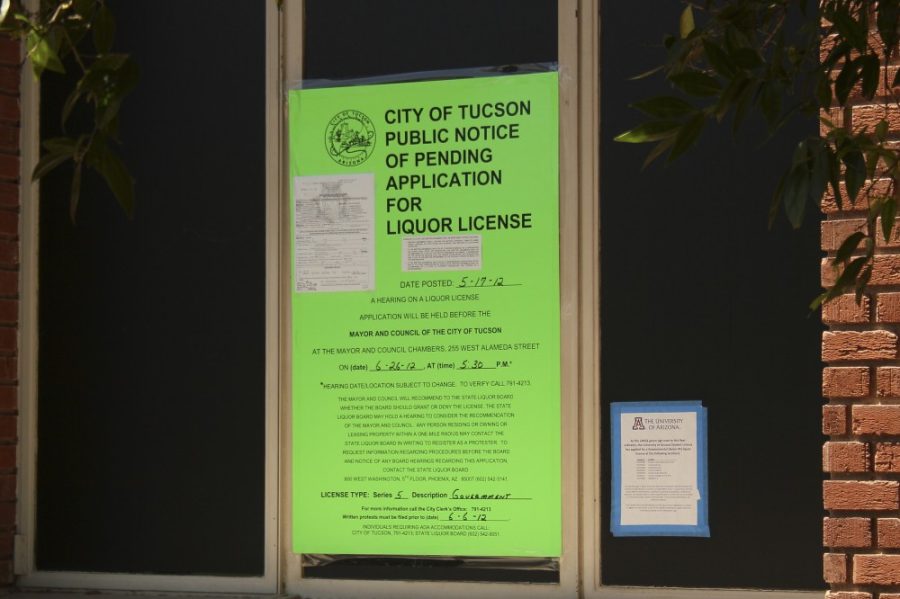UA administrators are asking the state to grant them a liquor license for seven buildings on campus with the hope that being able to serve alcohol will improve the university’s fundraising efforts and financial efficiency.
If the license goes through, liquor could be served at the Student Union Memorial Center, Centennial Hall, McClelland Hall, Arizona Stadium, Arizona State Museum, the Fine Arts Complex and Biosphere 2.
Obtaining the liquor license would streamline the process of being able to serve alcohol at private, invite-only events like alumni or fundraising dinners, according to Joel Hauff, the interim director for Arizona Student Unions. Public access to alcohol on campus — or lack thereof — will remain the way it is now without the license, and administrators said they are not planning to use the license as a means to distribute liquor to students, faculty or the general public.
Currently, the university is able to serve alcohol on campus for various types of events through a permitting process primarily governed by the union’s administration, Hauff added. This applies to a range of events, from private ceremonies where alcohol is served to public gatherings where liquor is vended to patrons like Homecoming on the UA Mall.
“What we wanted to be able to do as a campus was to make it a little bit easier for us to manage the events that were going on on campus by having a designated, governmental, No. 5 liquor license, which allows us to do either of those types of events without going through the special event permitting process,” Hauff said, adding that making the process more efficient would benefit the university financially in the long run.
The Series Five liquor license that the UA is applying for is one of 17 different types of licenses that the state offers, and pertains directly to a government entity, like a university, according to Sgt. Wes Kuhl, a special investigator with the Arizona Department of Liquor Licenses and Control. Each license also stipulates that the premises where the liquor will be served be situated at least 300 horizontal feet from a church or K-12 school.
Administrators working within the areas facing the acquisition of a liquor license share a general sense of optimism about the prospect, saying that it could improve how the department, and the university overall, hosts its guests when they visit for research presentations and similar events.
Such is the case that Hassan Hijazi referred to when he spoke about the liquor license at Biosphere 2, where he works as the director of external affairs. A collection of 28 casitas are situated on the Biosphere 2 campus, and house visiting scientists from all over the world for various types of conferences, Hijazi said.
“In order for us to generate funds and in order to expose the Biosphere 2 facility to the world and make it as a research tank, we have to make it easier for people to visit and have a more relaxed environment at the facility,” Hijazi said.
As far as funding goes, Hauff said that while he did not know the exact amount the university had spent going through the year-long licensing process, he said most of the costs went to application and legal fees.
“We realize that, over time, all that money will be worth it because we’ll be able to manage this ourselves, save on all this other work that we were doing to file special event permits and work with all these people and be in a position where we could just do what we need to get done,” Hauff said, adding that alcohol would also never be paid for with university funds.
While the idea of the UA having its own liquor license is a new one, fundraising events on campus aren’t and Hauff said the current economy has created a more competitive environment when it comes to raising money.
“There are a lot of people, a lot of organizations, a lot of non-profits that are competing for fundraising dollars in a very tight economy,” he said. “When you hold a plated dinner and charge $200 a plate for someone to come in and listen to a keynote speaker … alcohol is sort of an expectation.”
Hauff added that the university is trying to do the same job of fundraising and sponsorship recruiting that other non-profits are doing.
Update, June 26:
In an open town hall meeting, the liquor license for the university was approved. There were no oppositions.









